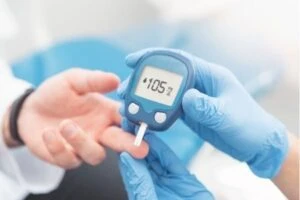
If you find you can no longer work because of diabetes complications, you may be entitled to long term disability benefits for either type 1 or type 2 diabetes mellitus.
What you may not realize is what it takes to prove your diabetes has caused you to be disabled. Being diagnosed with diabetes is a start, but that alone is never enough.
As disability lawyers, we represent people across the U.S. in their claims and appeals for Social Security disability, veterans compensation, or long term disability insurance benefits for diabetes. Today we explain how diabetes affects so many different body systems — and why this is one key to winning your disability benefits with diabetes mellitus.
How does diabetes affect the body?
Diabetes is one of the most common and serious chronic diseases there is. According to the Centers for Disease Control and Prevention (CDC), 34.2 million Americans had diabetes as of 2018. An estimated 88 million adults aged 18 years or older had prediabetes.
Diabetes mellitus is a disease of the endocrine system. An endocrine disorder is a condition that causes a hormonal imbalance when endocrine glands function abnormally. In the case of diabetes, the glandular organ involved is the pancreas. The hormone involved is insulin, which regulates the body’s blood sugar.
- In type 1 diabetes, the pancreas does not produce enough insulin
- In type 2 diabetes, the body cannot effectively use insulin
For a free legal consultation, call 800-562-9830
For many people, diabetes mellitus is hard to control.
Those who do not live with diabetes may not understand how it becomes so disabling. Serious diabetes complications can result over time, causing chronic, painful, and destructive injury to many body organs and organ systems, including the heart, blood vessels, eyes, kidneys, gastrointestinal tract, and nerves.
Uncontrolled diabetes can lead to:
Hyperglycemia (abnormally high blood sugar) – complications include diabetic ketoacidosis and chronic hyperglycemia. Long term impairments can affect various body systems including musculoskeletal, special senses and speech, genitourinary, cardiovascular, digestive, neurological, and mental disorders. Both Type 1 and Type 2 diabetes can cause hyperglycemia.
Hypoglycemia (abnormally low blood sugar) – complications include seizures and loss of consciousness.
Complications of diabetes attack various body systems.
- Cardiovascular diseases and stroke
- Nerve damage (neuropathy)
- Kidney damage (nephropathy)
- Eye damage (retinopathy)
- Foot disease and/or hand problems (diabetic neuropathy and peripheral vascular disease)
- Amputation of toes, foot or leg (a direct result of diabetic foot disease)
- Digestive system disorders
- Skin and mouth problems (bacterial and fungal infections)
- Hearing impairments
- Depression
- Alzheimer’s disease
Click to contact our disability lawyers today
Social Security Disability Insurance Benefits (SSDI) for Diabetes Mellitus
The Social Security Administration (SSA) lists diabetes as an Endocrine Disorder in its medical Listing of Impairments.
However, SSA does not list diabetes individually as an impairment. SSA looks at how disorders resulting from diabetes affect different body systems. SSA also considers the combined effects of your impairments.
For example, hyperglycemia may damage your nerve and blood vessel function, which in turn can damage any number of body symptoms, such as your eyes, heart, kidneys, extremities, digestive system, or mental state. If your condition(s) fulfill the medical requirements of one (or more) affected SSA Listings, you may qualify for Social Security disability benefits for diabetes mellitus.
If your condition does not fulfill SSA listing criteria, SSA then goes to the next step to evaluate your disability claim.
At this stage of review, disability is based on whether you have the residual functional capacity (RFC) to work and earn a living, given the combined effect of all of your health problems. RFC is a measure of the maximum you can still do despite your impairments.
Proving your diabetes case to the SSA can be a challenge!
Before applying for SSDI benefits for diabetes, or appealing a claim denial, it is essential to understand and follow SSA’s rules. You have to prove why you need SSDI, in a way that SSA does not find deficient.
Your claim needs to provide objective medical evidence about your condition, as well as your RFC assessment. You must include complete information about yourself and your work history, including relevant work during the past 15 years, and job skills that can transfer to another type of occupation.
For someone dealing with diabetes complications, this can be overwhelming. We understand this is no time for you to get lost in the complex application or appeals process with Social Security. We take care of the entire SSDI paperwork and process, whether you are first filing for benefits or you need to appeal a denial of your claim.
Complete a Free Case Evaluation form now
Individual or Group Long-term Disability (LTD) Benefits for Diabetes Mellitus
You may have long term disability insurance coverage under an employee benefits plan or under an individual insurance policy.
The first step in filing an LTD claim is to understand the terms and conditions of your policy as they relate to your diabetes. Your disability insurance plan or policy will contain all of the provisions and definitions that you must meet. Generally, you must prove to the insurance company that you can no longer perform the important duties of your occupation, and often after one or two years, you must prove you cannot work at any occupation.
Unfortunately, it’s not always easy to get the LTD benefits you’re entitled to. What you will run into with most insurers is their aversion to paying deserving claims.
Be prepared for claim denials based on allegations that diabetes is a preexisting condition, or arguments that you have not followed your prescribed treatment and medication regimen (their assumption being, if you did you would be better.)
Insurers tend to view diabetes claims as only relevant for short term disability benefits, and often favor the opinions of their paid, in-house doctors over your treating physician’s statement that you are disabled.
An experienced disability attorney can stop the insurance carrier’s games in their tracks and help you receive the maximum possible benefit from your claim. We are nationally recognized legal advocates for individuals and employees who have been wrongly denied benefits for complications from diabetes.
We can help you throughout the application process, to appealing a denied claim, representing you in a settlement, or fighting for your rightful benefits in court.
Veterans Disability Compensation for Diabetes Mellitus
The VA reports that diabetes affects nearly 25 percent of VA’s patient population. It is also the leading cause of blindness, end-stage renal disease, and amputation for VA patients.
Herbicide exposure can increase veterans’ chances of having Type 2 diabetes. If your diabetes developed during or after service in Vietnam, diabetes mellitus is presumed to be service-connected. This applies to any Agent Orange exposure that includes military service between January 9, 1962, and May 7, 1975, and including the Republic of Viet Nam, Brown Water Navy Veterans, Thailand military bases, and certain Korean DMZ Veterans.
Otherwise, you must prove your diabetes originated or was aggravated while you were on active military duty; this can be a direct service-connection or a secondary service connection.
Depending on the severity of the condition, VA ratings for diabetes mellitus type 2 can range from 100%, 60%, 40%, 20%, or 10% disability and are listed in 38 CFR 4.119, Diagnostic Code 7913.
A good attorney for disabled veterans can make a world of difference.
At the law firm of Marc Whitehead & Associates, our VA-accredited claims attorneys represent military veterans throughout the United States with diabetes mellitus and complications arising from this disease. If you are unsatisfied with your rating decision or need assistance with your claim, call to discuss your options and determine how we can help.
Make Sure You Take the Right Steps with Your Diabetes Disability Claim
Social Security, insurance companies, and the VA will all require your medical history and ongoing screening, along with medical records from your treating doctor, your endocrinologist, and any other specialists you see for diabetes complications (such as your heart doctor or kidney doctor).
Regular screening is important to detect diabetes-related health problems early and to track treatment regimens against signs of worsening conditions. We can help you in all of these vital areas and more, to fully develop your claim or to fight a claim denial on appeal.
Call on us 24/7 — 1 (800) 562-9830. We handle cases nationally.
More articles on getting disability benefits with diabetes.
Diabetes Statistics
Diabetes mellitus affects us all. If we do not have it ourselves, we have family and friends who do. In the latest National Diabetes Statistics Report, Estimates of Diabetes and Its Burden in the United States, the CDC affirms that as of 2017:
- Diabetes is the seventh leading cause of death in the United States;
- Diabetes is the leading cause of new cases of blindness; 11.7% of working-age Americans with diabetes reported vision disability, including blindness;
- Among working-age Americans, diabetes is the leading cause of end-stage kidney disease;
- Diabetes is the most frequent cause of non-traumatic lower-limb amputation;
- 77% of all hospitalizations and 80% of all mortality in diabetes is secondary to cardiovascular disease.
Call or text 800-562-9830 or complete a Free Case Evaluation form




